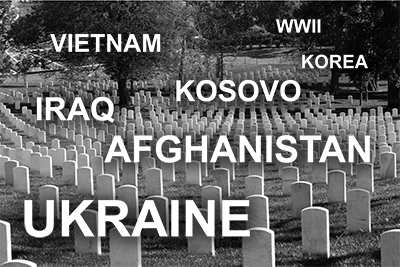 by Yosi McIntire
by Yosi McIntire
With a reason for every war and a war for every reason, what hope is there for peace? War is always a tragedy for all concerned. Every war challenges international law as well as the authority and credibility of the UN and its Charter—designed in 1945 to “save succeeding generations from the scourge of war.”
My entire life I’ve questioned wars from different perspectives. I have been opposed to all wars. But Chapter VII of the UN regulates “Actions with Respect to Threats to the Peace, Breaches of the Peace, and Acts of Aggression.” However, we have seen NATO’s military campaigns in Yugoslavia, Afghanistan and Iraq egregiously violate Art. 2(4) with impunity. Art. 2(4) states:
All Members shall refrain in their international relations from the threat or use of force against the territorial integrity or political independence of any state, or in any other manner inconsistent with the Purposes of the United Nations.
All UN member states have an obligation to settle differences by peaceful means through in-good-faith negotiations. Now we see the Russian military violating the UN Charter. And again, I find myself seeing nations resort to war. Each new war brings flashbacks of countless others where international law was transgressed. I wonder if the credibility of the UN Charter will ever be real.
In the Ukraine, each side makes competing arguments concerning international laws. One focuses on international order, the other on justice and rights. Each thinks the other’s reasoning is a ploy. The position of the US and NATO rests on the principle of sovereign rights, non-intervention, and a state’s right to choose their allies—the integrity of sovereignty.
On the other side, Russia has for years considered NATO’s expansion to her borders an existential threat. The vast majority of the population in Crimea and in the Donbas identify as Russian. So, Russia also points to the right to self-determination and the responsibility to protect people in harm’s way. (See editor’s note below.)
At some point, the fighting will stop. The sooner the better! Clearly the European Union, Ukraine, and Russia would do better if instead of fighting, they cooperated with one another. Eventually a security architecture that takes into account the national security concerns of all countries—including Russia—will be found. The perpetuation of war only escalates death and destruction, increases global climate change and global food-insecurity, and risks global nuclear engagement.
Editor’s Note: Shortly after the breakup of the Soviet Union, Ukraine held a national referendum in which more than 90% of its population voted to make Ukraine an independent state. In 1994, the U.S., Boris Yeltsin as President of the Russian Federation, and the United Kingdom signed the Budapest Memorandum with Ukraine. In exchange for Ukraine’s surrender of all nuclear weapons, they pledged to respect Ukraine's independence and sovereignty within its existing borders, and refrain from the threat or the use of force against them.